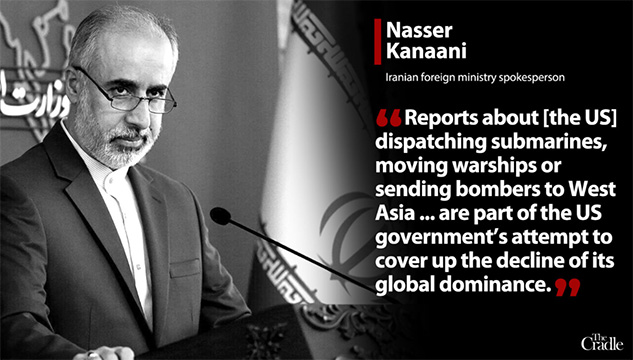
M.K. Bhadrakumar, Indian Ambassador and prominent international observer, notes that three ominous US-related developments last week grate against the overall easing of tensions in the West Asian region:
- Firstly, Israeli Prime Minister Benjamin Netanyahu’s phone call on Tuesday to UAE President Mohamed bin Zayed al-Nahyan (MbZ), seeking a meeting to breathe life into the Abraham Accords;
- Secondly, a hush-hush trip to Saudi Arabia by CIA Director William Burns to meet with Crown Prince Mohammed bin Salman (MbS) as Chinese diplomacy accelerates in West Asia;
- Thirdly, the arrival of nuclear-powered attack submarine USS Florida into Persian Gulf waters.
These three developments took place in the immediate context of a groundbreaking meeting between Saudi Foreign Minister Faisal bin Farhan Al-Saud and his Iranian counterpart Hossein Amir Abdollahian on Thursday in Beijing.
In a bizarre coincidence, the USS Florida also transited the Suez Canal on Thursday on a mission in support of the Bahrain-based US Fifth Fleet, whose area of operation includes the Persian Gulf, Red Sea, and parts of the Indian Ocean.
In the weeks since Saudi Arabia and Iran’s 10 March agreement to restore diplomatic relations, top officials of both states have spoken on the phone several times, and Saudi King Salman has invited Iranian President Ebrahim Raisi to visit Riyadh. The new meeting of the two foreign ministers in Beijing signals that Raisi’s visit to Riyadh is not far off. The joint statement issued after the Beijing meeting shows that the cup of Saudi-Iranian detente is rapidly filling up.
A senior Iranian official has openly sought Saudi investments. Earlier, Saudi Finance Minister Mohammad Al Jadaan flagged “a lot of opportunities” in Iran for Saudi investment. Direct flights are being resumed.
Basically, the meeting in Beijing on signals that Riyadh and Tehran are actively striving for a broader cooperative relationship, and China is stressing that it intends to continue playing a pivotal role as mediator and facilitator.
Chinese commentators are forecasting that Beijing is willing to act as a coordinator in resolving conflicts in the West Asian region, as it has great acceptability among regional states. China senses that Saudi Arabia’s autonomy is further increasing – adopting economic strategies without dependence on the US, and no longer politically obedient to Washington’s diktats.
The recent OPEC+ decision to further cut oil production is seen as evidence of this geopolitical shift. To quote from a ‘Global Times’ commentary, “The mood of resentment toward the US in the Middle East [West Asia] is pervasive, not just in Saudi Arabia, as the US involvement in the region is seen as primarily driven by a desire to seize oil resources… No one wants to be the US’ pawn forever.
“The US’ attempts to control the global energy landscape, especially against the backdrop of the Russia-Ukraine conflict, have angered many countries, as Washington constantly demands that some Middle Eastern [West Asian] countries sacrifice their own interests to suppress Russia.
“Washington needs to understand that the regional affairs should be, and will be decided by relevant countries in the Middle East [West Asia]. The US is still living under the illusion of American hegemony and determinism.”
In contrast, US media is awash with panic over American retrenchment in West Asia. There is a palpable sense of frustration in Washington. The decades-old US-Israeli strategy of “divide-and-rule” by propping up Iran as the bogeyman has lost traction.
The specter that haunts Washington is that for the first time since the 1979 Islamic Revolution in Iran, Tehran is inexorably strengthening its ties with Gulf Cooperation Council (GCC) states, which in turn will incrementally bury western sanctions against Iran.
A US official was quoted by ‘Al Arabiya English’ saying that Burns’ mission to Saudi Arabia was actually ‘to reinforce US commitment to intelligence cooperation’. Quite possibly, Burns shared with MbS (Mohammed bin Salman, Crown Prince and Prime Minister of Saudi Arabia) the latest intelligence reports regarding Iran.
Nonetheless, Saudi Arabia has gone along with the foreign ministers meeting hosted by Beijing, signaling that its compass for improving ties with Iran is set and, importantly, that Riyadh will not be party to any US military action against Iran.
Significantly, the White House and State Department officials have calculatedly chosen to commend the China-brokered Saudi-Iran deal, albeit couched in platitudes.
US President Joe Biden also reacted in a muted manner to the highly provocative OPEC+ decision to further slash oil production next month, which, he knows fully well, is anchored on a profound understanding between Riyadh and Moscow and will bring in a huge windfall of profits for Russia from its oil exports.
Curiously, Netanyahu’s office staked a claim that MbZ (the President of the United Arab Emirates Sheikh Mohamed bin Zayed Al Nahyan known by his initials as MbZ), called him and that the two leaders “agreed to continue the dialogue between them in a personal meeting in the near future.” But The Emirates News Agency has since reported that the conversation actually took place at Netanyahu’s initiative and that MbZ said: the UAE “would work with Israel, fellow Arab nations, and international partners to avoid regional escalation and advance a path to peace and stability.”
The news report failed to mention any commitment by MbZ to meet Netanyahu, who is, of course, all dressed up and raring to go, unwilling to give up yet that Israel has lost the regional plot.
Meanwhile, the USS Florida will be lurking in the waters of the Persian Gulf in a projection of American power with up to 154 Tomahawk land-attack cruise missiles. This message is warning to both Arab states and Beijing that ‘there can be no new sheriff in town,’ now or in the conceivable future.
Herein lies the real danger, M.K. Bhadrakumar stresses.
read more in our Telegram-channel https://t.me/The_International_Affairs

 15:51 13.04.2023 •
15:51 13.04.2023 •






















